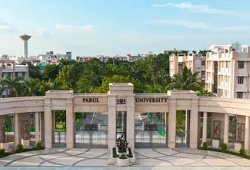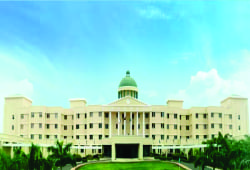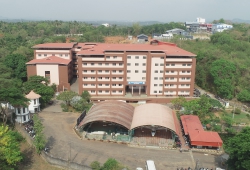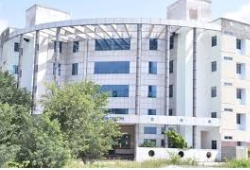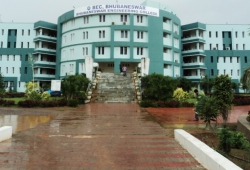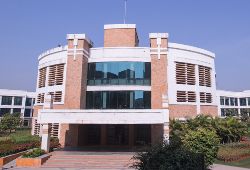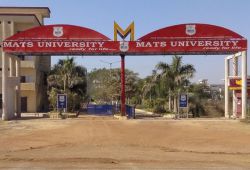Bhopal is the capital of the state of Madhya Pradesh. Bhopal is in the center of India that’s why the plane and train connectivity is excellent. The city is famous for his 8 beautiful lakes namely lower lake, Shahpura Lake, upper lake, Matia talab, etc. Bhopal is also a good place for education and environment. Choosing Aeronautical Engineering colleges in Bhopal is a good choice. An aeronautical Engineering college in Bhopal provides great education and facilities to the students.
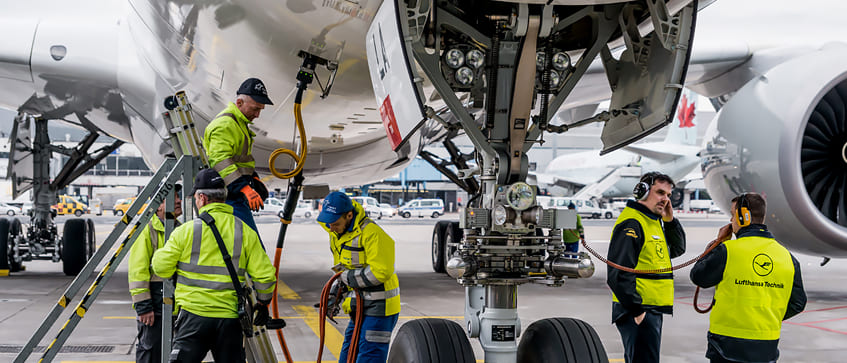
Best Aeronautical Engineering Colleges in Bhopal
Some of the best colleges for aeronautical engineering are located in Bhopal, a city renowned for its rich history and culture. These universities are well-known for their commitment to academic excellence and for providing courses that equip students for fascinating jobs in the aerospace and aviation industries. These universities give prospective aeronautical engineers the information and abilities they need to succeed in these fast-paced industries, with a strong emphasis on hands-on training and state-of-the-art facilities. The Aeronautical Engineering colleges in Bhopal offer a strong educational foundation to start your dreams, whether they are to design airplanes or explore the boundless potential of space.
Aeronautical Engineering Course Fees in Bhopal
Now, let's explore the Aeronautical Engineering course fees in Bhopal for different degree levels:
Diploma in Aeronautical Engineering
- For those who want to work in the field, diploma programs in aeronautical engineering are a great place to start because they are typically less expensive. Usually, the course lasts between one and two years. Depending on the institution, the fees can vary from INR 40,000 to INR 1,00,000.
Bachelor's Degree in Aeronautical Engineering
- A bachelor's degree is a common option for people looking for a thorough education in aeronautical engineering. Typically, a bachelor's program lasts four years. In Bhopal, course fees can range from INR 1,00,000 to INR 4,00,000 or more for respectable colleges.
Master's Degree in Aeronautical Engineering
- People who want to specialize and grow in their careers frequently enroll in Master's programs in Aeronautical Engineering. Depending on the reputation of the institution, these programs can cost anywhere from INR 1,50,000 to INR 6,00,000 and usually last for two years.
Scholarships and Financial Aid
- As previously stated, financial aid and scholarships can significantly lessen the financial burden. For deserving students, a number of public and private institutions in Bhopal provide grants and scholarships. To lower the cost of your education, it is a good idea to look into and apply for these opportunities.
Eligibility Criteria for Aeronautical Engineering Colleges in Bhopal
To secure admission to a prestigious aeronautical engineering college in Bhopal, you must meet the following criteria:
- Academic Qualifications: Having a solid background in mathematics, physics, and chemistry and passing the 10+2 exam.
- Entrance Examinations: Passing state-level engineering entrance exams or entrance exams such as JEE Main, JEE Advanced, or AME CET.
- Minimum Aggregate Marks: Minimum aggregate marks (usually 50% or higher) in the qualifying examination.
- Additional Entrance Exams: Candidates may need to pass extra entrance exams administered by the individual colleges in order to be admitted to some of them.
- Age and Nationality: In order to be eligible, applicants may need to meet certain nationality or age restrictions set by particular colleges.
Aeronautical Engineering Campus Facilities in Bhopal
For practical training and research, aeronautical engineering depends on specialized infrastructure and facilities. This section will examine the cutting-edge resources offered by Bhopal's aeronautical colleges.
- Cutting-Edge Laboratories: These labs give students a practical understanding of aviation technology by housing wind tunnels, material testing equipments, and flight simulation tools.
- Aircraft Maintenance Hangars: Hangars on campus where students can get hands-on experience fixing and maintaining aircrafts.
- Rich Library Resources: Libraries that are well-stocked with a vast array of books, research papers, and internet resources to help students learn more and do research.
- Aviation Workshops: Workshops with the instruments and equipment needed to construct and modify aircraft parts provide hands-on experience in aircraft engineering.
- Computer Labs: Computer labs with software for engineering projects and aerodynamic simulations allow students to use technology in their education.
- Interactive Classrooms: The educational experience is improved by the use of audio-visual aids in modern classrooms that promote interactive learning.
- Research Centers: Committed to state-of-the-art aerospace research, offering students chances to work on creative projects.
- Hostel Facilities: On-campus housing promotes a feeling of community and togetherness while ensuring students' safety and convenience.
- Sports and Recreation: Sports fields, gyms, and cultural clubs provide a well-rounded lifestyle that supports students' mental and physical health.
Aeronautical Engineering Colleges Admission Process in Bhopal
The following steps are part of the AME CET admissions process at Bhopal's aeronautical engineering colleges:
- Application: The first step for prospective students is to fill out the AME CET application form with all the required information.
- Entrance Exam: The AME CET exam, which evaluates candidates' knowledge and proficiency in aircraft maintenance engineering, must be taken.
- Counseling: Eligible candidates are invited to attend counseling sessions following the announcement of the exam results. Based on their AME CET rankings and the number of seats available, students can choose the colleges and courses they want to take during these sessions.
- Document Verification: Candidates must provide necessary documentation, such as their identification documents, AME CET scorecards, and educational certificates, as part of the counseling process.
- Seat Allotment: Candidates are given seats by colleges according to their selections and performance on the AME CET Exam.
- Fee Payment: To guarantee their spot at the selected college, admitted students must pay the necessary fees.
- Reporting to College: Lastly, in order to finish the admissions requirements and start their aeronautical engineering program, students who were accepted through the AME CET must report to their respective colleges on the specified date.
Aeronautical Engineering Entrance Exam in India
Entrance exams for aeronautical engineering are essential for evaluating prospective students' aptitude, knowledge, and abilities. These tests are essential for getting into programs in aeronautical engineering at many Indian colleges and universities. The following well-known entrance exams are accepted for admission to programs in aeronautical engineering:
- Joint Entrance Examination (JEE) Main: The national entrance exam known as JEE Main assesses applicants' knowledge of mathematics, physics, and chemistry. JEE Main scores are taken into account for admission to many esteemed engineering colleges, including those in Bhopal.
- Joint Entrance Examination (JEE) Advanced: For candidates who pass JEE Main, the next step is JEE Advanced. Admission to the esteemed Indian Institutes of Technology (IITs), some of which provide programs in aeronautical engineering, is determined by this.
- Aircraft Maintenance Engineering Common Entrance Test (AME CET): The AME CET was created especially for admission to programs in aircraft maintenance engineering, which is closely related to aeronautical engineering. Colleges in Bhopal and other parts of India that offer these programs accept it.
- State-Level Engineering Entrance Exams: Numerous Indian states administer engineering entrance exams, and students can use their results to gain admission to state-specific aeronautical engineering programs.
Download Brochure for Aeronautical Engineering Colleges in Bhopal
Download the brochure for Bhopal's Aeronautical Engineering Colleges to get started on your path to the aerospace sector. This will be the beginning of a fascinating career in aeronautical engineering.
Specializations in Aeronautical Engineering
With the variety of specializations available in aeronautical engineering, students can customize their education to focus on particular facets of the aerospace sector. To satisfy the wide range of needs of the aviation and aerospace industries, Bhopal's aeronautical engineering colleges offer a variety of specialized programs. Students can choose from the following important specializations:
- Aircraft Design and Manufacturing: Discusses aerodynamics, structural design, materials, and manufacturing processes in relation to the development of aircraft. Students become proficient in creating safe and effective aircraft designs.
- Aerospace Propulsion: Focuses on propulsion systems, rockets, and aircraft engines. Students gain knowledge of engine design, flight mechanics, and propulsion principles.
- Avionics and Control Systems: Focuses on the electronic systems found in aircrafts, such as flight control, navigation, and communication. This area of expertise explores the technology that maintains the efficiency and safety of aircrafts.
- Aircraft Maintenance and Repair: Focuses on maintaining, inspecting, and repairing aircraft to guarantee their safety and airworthiness.
- Space Technology and Exploration: Discusses satellite technology, space mission planning, and spacecraft design. Projects involving satellites, space missions, and interplanetary exploration may be undertaken by students.
- Aeronautical Research and Development: Focuses on cutting-edge aeronautics research, involving students in projects that challenge the limits of aerospace innovation and technology.
- Unmanned Aerial Vehicles (UAVs) and Drones: Focuses on the development, use, and operation of unmanned aerial vehicles for data collection, delivery, and surveillance.
- Aerospace Management: Covering subjects like airline management, aviation marketing, and aviation operations, and aimed at students interested in the business side of the aviation sector.
Higher Qualifications in Aeronautical Engineering
The dynamic and constantly changing field of aeronautical engineering provides professionals with chances to further their careers, focus on particular areas, or conduct cutting-edge research. Aeronautical engineers may want to take into consideration the following additional qualifications:
- Master's in Aeronautical Engineering (M. Tech/MS): Professionals can specialize in areas such as structural design, propulsion systems, or aerodynamics with this postgraduate degree.
- Doctor of Philosophy (Ph.D.) in Aeronautical Engineering: A Ph.D. is perfect for people who are enthusiastic about research and innovation because it provides the opportunity to significantly advance the field and pave the way for careers in academia, research, or high-level aerospace positions.
- Master of Business Administration (MBA): An MBA combined with a technical background can lead to management and leadership positions in the aerospace sector, where business-savvy aeronautical engineers are highly sought after.
- Certifications and Licenses: A licensed aircraft maintenance engineer (AME) or certification in a particular software or technology utilized in the aerospace industry are just two of the many licenses and certifications that aeronautical engineers can pursue.
- Short-Term Courses and Workshops: Attending short-term classes, workshops, and seminars provided by academic institutions and industry associations will help you stay current on the most recent developments in the field.
- Specialized Master's Programs: A well-rounded education with a specific focus is provided by certain universities' specialized master's programs in fields like space technology, aviation safety, or aerospace management.
- Online Courses and Massive Open Online Courses (MOOCs): Numerous MOOCs and online courses are available, covering a broad range of aerospace-related subjects and providing a flexible and affordable means of gaining new knowledge and abilities.
Top Recruiters for Aeronautical Engineering Graduates
Gaining knowledge about the best recruiters in the industry can help you improve your chances of landing a job in the future. Graduates of Bhopal's aeronautical engineering program have a variety of options, as many well-known companies are keen to employ them. These are a few of the best recruiters:
- Indian Space Research Organization (ISRO): Provides employment opportunities in space exploration projects, rocket propulsion, and satellite development.
- Hindustan Aeronautics Limited (HAL): Aeronautical engineers are sought after by a large aerospace and defense company for positions in the production of aircraft and helicopters.
- Defense Research and Development Organization (DRDO): Includes aeronautical engineers in defense technology projects, such as avionics and missile development.
- Bharat Heavy Electricals Limited (BHEL): Employs aeronautical engineers to work on power-generating gas turbine equipment.
- National Aeronautics Laboratory (NAL): Emphasizes aerospace research, with aeronautical engineers participating in wind tunnel testing, aerodynamic research, and aircraft design.
- Air India: Aeronautical engineers are employed by the national carrier to maintain and engineer aircraft, guaranteeing flight safety.
- Private Aerospace Companies: Companies like Tata Advanced Systems, L&T, and Mahindra Aerospace provide diverse career opportunities in aerospace technology and manufacturing.
- Aviation Companies: airlines such as indigo, spicejet, and Vistara hire aeronautical engineers for aircraft maintenance and safety roles.
- Research and Development Centers: Aeronautical engineering graduates can engage in cutting-edge research in educational institutions, research centers, and independent organizations.
- Consulting and Engineering Firms: Consulting giants like Wipro, TCS, and Infosys have aerospace divisions that offer engineering solutions to the aviation and aerospace industry.
Aeronautical Engineering Course Syllabus
Understanding the course syllabus is crucial for prospective students. Aeronautical engineering programs in Bhopal offer a comprehensive curriculum that covers various subjects throughout the four-year duration of the program. Here's an overview of the typical course syllabus:
First Year Courses
- Mathematics and Applied Mathematics: Includes topics like calculus, linear algebra, differential equations, probability, and statistics.
- Physics: Covers mechanics, electromagnetism, and waves and optics.
- Engineering Mechanics: Explores statics and dynamics, kinematics, and equilibrium of structures.
- Engineering Graphics: Teaches geometrical drawing, projections, and sectional views.
Second Year Courses
- Aerodynamics: Focuses on fundamental principles, compressible and incompressible flows, and boundary layers.
- Fluid Mechanics: Addresses fluid properties and behavior, fluid statics and dynamics, and control volume analysis.
- Materials Science and Engineering: Covers properties of materials, material selection for aerospace applications, and heat treatment and material testing.
- Thermodynamics: Introduces basic concepts, laws of thermodynamics, and gas dynamics.
Third Year Courses
- Aircraft Structures: Includes structural analysis, stress and strain analysis, and finite element analysis.
- Aircraft Propulsion: Focuses on gas turbine engines, jet propulsion, and propeller theory.
- Aircraft Design and Manufacturing: Covers the design process, manufacturing techniques, and the use of composite materials in aircraft design.
- Avionics and Control Systems: Explores avionics components and systems, aircraft control systems, and flight control systems.
Fourth Year Courses
- Flight Mechanics and Aircraft Performance: Addresses aircraft performance parameters, stability and control, and flight testing.
- Aircraft Maintenance and Repair: Focuses on maintenance practices, aircraft inspection, repair, and regulatory compliance.
- Aerospace Propulsion Systems: Introduces advanced propulsion systems, rocket propulsion, and hybrid propulsion.
- Project Work and Internships: Involves a final year project and industry internships to apply learned knowledge in real-world scenarios.
Aeronautical Engineering Course Duration
For a bachelor's degree, aeronautical engineering programs in Bhopal typically last four years, or eight semesters. Students study a variety of topics during this time and acquire the information and abilities needed for a prosperous career in the aerospace sector. A significant portion of their path to becoming skilled aeronautical engineers is completed during these four years.



